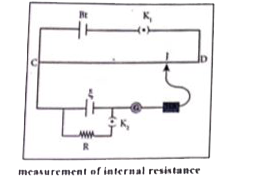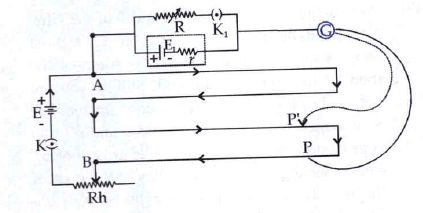How will you measure the internal resistance of a cell by potentiometer?Solution in Tamil
To measure the internal resistance of a cell, the circuit connections are made as shown in Figure. The end of the potentiometer wire is connected to the positive terminal of the battery B and the negative terminal of the battery is connected to the end D through a key K1. This forms the primary circuit.
(ii) The positive terminal of the cell & whose internal resistance is to be determined is also connected to the end of the wire. The negative terminal of the cell ξ is connected to a jockey through a galvanometer and a high resistance.

(iii) A resistance box R and key K2, are connected across the cell ξ. With K2, open, the balancing point J is obtained and the balancing length C1, = 11, is measured. Since the cell is in open circuit, its emf is
ξ=Ii ...(1)
(iv) A suitable resistance (say, 10Ω) is included in the resistance box and key K2 is closed. Let r be the internal resistance of the cell. The current passing through the cell and the resistance R is given by
I=ξR+r
The potential difference a across R is
V=ξRR+r
(v) When this potential difference is balanced on the potentiometer wire, let l1, be the balancing length
Then ξRR+r∝l2 ...(2)
From equations (1) and (2)
R+rR=l2l2
+rR=l2l2
r=R[l1l2l2]
∴ r = R[l1−l2l2]
(vi) Substituting the values of the R, I1, and l1, the internal resistance of the cell is determined. The experiment can be repeated for different values of R. It is found that the internal resistance of the cell is not constant but increases with increase of external resistance connected across its terminals.
Similar Questions
Define internal resistances of a cell. explain how the internal resistance of a aprimary celle can be determined using a Potentiometer.
03:31View SolutionWhat is the principle of a potentiometer? With the help pf circuit diagram, explain the use of potentiometer to measure internal resistance of a given primary cell.
03:50View SolutionWhat is the internal resistance of a cell ? How it can be measured ?
05:23View SolutionDescribe with the help of neat diagram how will you determine the internal resistance of a cell by using potentiometer. Derive the necessary formula.
 07:24View Solution
07:24View SolutionUsing a potentiometer how do you determine the internal resistance of a cell?
08:57View SolutionHow will you use potentiometer to determine internal resistances of a cell?
04:23View SolutionWhat is the principle of a potentiometer? With the help pf circuit diagram, explain the use of potentiometer to measure internal resistance of a given primary cell.
03:50View SolutionDefine potentiometer. How can it be used to measure the internal resistance of cell ?
View Solution
